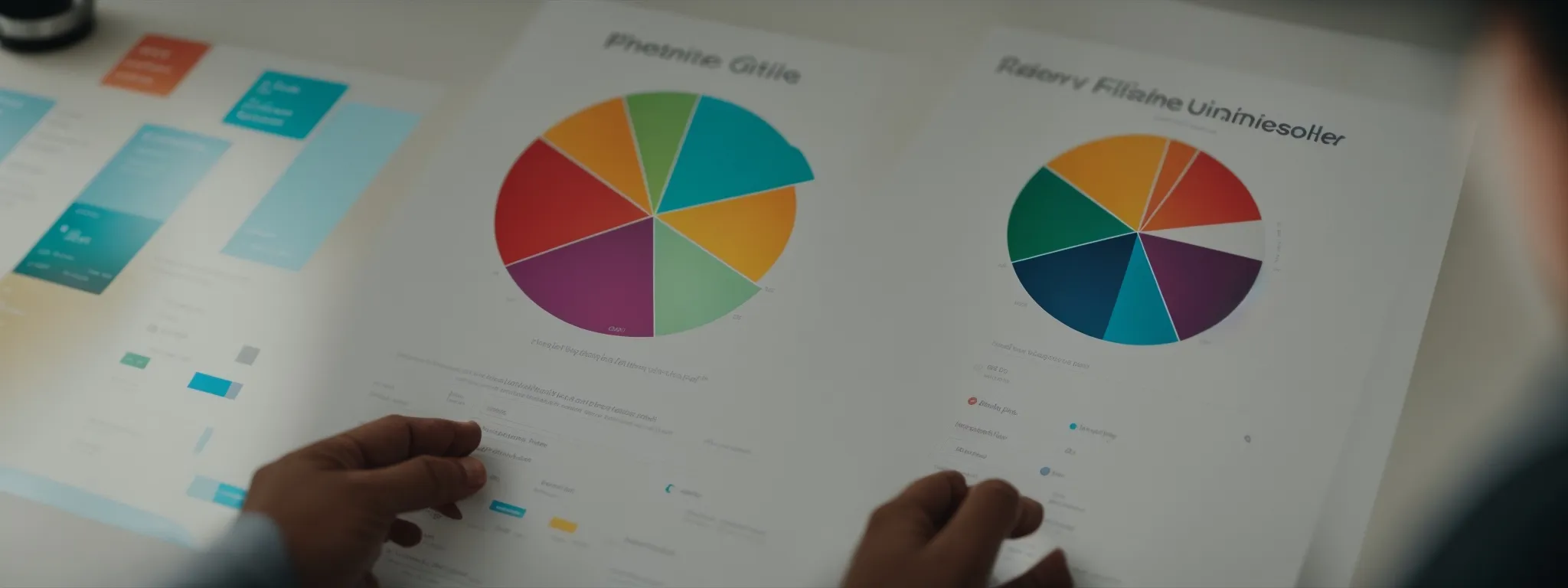How To Rank for Keywords
Mastering Keyword Optimization: How to Rank Successfully for Your Targeted Terms In a digital market teeming with competition, mastering keyword optimization stands as the beacon that guides […]
Mastering Keyword Optimization: How to Rank Successfully for Your Targeted Terms
In a digital market teeming with competition, mastering keyword optimization stands as the beacon that guides search engines to a website’s shores.
It’s an intricate dance of selecting the right terms, understanding searcher intent, and weaving those terms into web pages in a manner that resonates with both the user and the search engine algorithms.
To ascend the Google search results, businesses must not only choose keywords wisely but also craft a content strategy that engages and converts.
This article shines a light on the methods experts use to rank successfully for targeted terms, offering actionable insights to elevate one’s online presence.
Keep reading to unlock the secrets of effective keyword optimization that could herald a new era of online visibility for your brand.
Key Takeaways
- Keyword Optimization Is Essential for Aligning With Searcher Intent and Enhancing Website Visibility in Search Engine Results
- Strategic Use of Keywords Within Title Tags, Meta Descriptions, and Header Tags Is Critical for Attracting Users and Search Engine Algorithms
- Utilizing Advanced Tools Like SearchAtlas SEO Software Can Significantly Improve Keyword Strategy and Search Engine Rankings
- Continuously Updating Content With Relevant Keywords in Response to Evolving Search Behavior Can Sustain and Improve a Site’s Search Engine Presence
- Regular Analysis of Keyword Performance Informs Ongoing Refinements to an SEO Strategy, Maintaining a Competitive Edge in Search Rankings
Understanding the Basics of Keyword Optimization

Grasping the fundamentals of keyword optimization is vital for any marketer intent on elevating their web page to the summit of search engine results pages.
This strategic approach enables experts to refine and tailor their page content, harmonizing it with the search queries their audience is actively pursuing.
Keyword optimization transcends mere incorporation of target terms; it encompasses a deep understanding of how meticulously chosen words can be a linchpin in the complex mechanism of ranking factors.
By recognizing the significance of keyword optimization, professionals unlock the potential to enhance visibility, drive search traffic, and connect with the searcher, ultimately culminating in a transformative impact on their search engine ranking.
Define What Keyword Optimization Means
Keyword optimization stands as the art of selecting and implementing the most appropriate keywords within a website’s content to maximize its visibility in search engine results. It is a practice rooted in the analysis and understanding of how certain search terms can attract visitors to a site, emphasizing the importance of aligning content with the searcher’s intent.
At its core, this facet of search engine optimization ensures that content not only includes relevant keywords but also resonates with the target audience’s search query, thus improving the web page’s relevance and authority in the eyes of search engines. This alignment between user intent and page content is pivotal to achieving prominent search engine rankings for desired search terms.
Explain Why Keyword Optimization Is Crucial
Effective keyword optimization is critical as it serves as a guiding beacon for search engines to discern a site’s relevance and value to a searcher’s needs. Without it, even the most well-crafted website content risks obscurity, failing to reach the user eagerly seeking information.
Moreover, adept utilization of keyword optimization fuels a site’s ability to outmaneuver competitors, positioning it at the forefront of Google search results. This essential strategy directly influences click-through rates (CTR), steering thousands of potential visitors toward the marketer’s digital territory.
Overview of How Keywords Impact Rankings
Keywords serve as one of the primary conduits through which a web page communicates its content’s relevance to search engines. A carefully optimized keyword strategy ensures a website aligns with specific terms and phrases correlated with higher search volume and searcher intent, increasing the likelihood of achieving a coveted position on search engine results pages.
It’s not just about visibility; keywords are part of a broader narrative that search engines use to gauge a page’s authority and user experience. The strategic placement of terms within title tags, meta descriptions, and headers plays a crucial role in drawing both the user and search engine algorithms, reflecting the content’s pertinence to the search query:
- Title tags garner immediate attention in search engine results, beckoning users with the promise of relevant information.
- Meta descriptions offer a succinct preview, enhancing the user’s understanding of the page content’s relevance.
- Header tags structure the content, guiding both users and search algorithms through the hierarchy of information.
Crafting a Robust Keyword Research Strategy

Embarking on the journey of keyword research is a pivotal step for any SEO professional aiming to elevate their client’s online presence.
Mastery of this discipline involves not merely identifying a seed keyword but delving into the intricacies of the niche and uncovering a wealth of related terms that resonate with the target audience.
Rigorous evaluation using advanced keyword research tools is essential to assess the competitive landscape, weighing keyword difficulty against potential search volume.
In mastering this delicate balance, SEO experts are equipped to delineate an SEO content strategy that positions their client’s web pages to rank successfully for their chosen search terms.
Identify Your Niche and Related Keywords
Identifying one’s niche sets the stage for successful keyword optimization, where a deep dive into the specific interests and needs of an audience unfolds. An SEO expert must recognize the unique landscape of their client’s market, discerning the nuances that drive searcher behavior and inform a targeted keyword list.
In this process, related keywords emerge as significant players, providing a broader spectrum of opportunity for a website to capture various search queries. LinkGraph’s SEO services employ comprehensive keyword research tools, ensuring that each related term is a strategic piece chosen to align perfectly with the intended audience’s interests and search habits.
Utilize Effective Keyword Research Tools
Implementing the right keyword research tools is the backbone of an SEO professional’s strategy, enabling a precise and data-driven approach to search engine optimization. LinkGraph’s SearchAtlas SEO software sets the standard with its robust analytical capabilities, providing SEO experts with actionable insights into keyword performance, search volume, and competitive benchmarks.
Professionals utilizing LinkGraph’s SEO services find that comprehensive tools such as SearchAtlas streamline the discovery of tailored keyword ideas that align with their client’s objectives. With in-depth analytics at their fingertips, SEO experts can meticulously craft a keyword strategy that targets high potential terms, designed to elevate their website’s ranking and draw a more significant user base.
Analyze Keyword Difficulty and Search Volume
An SEO expert’s grasp of keyword difficulty and search volume can influence the trajectory of a website’s visibility in the crowded online space. Engaging in this analysis, professionals discern how vigorously a term is contested, providing clarity on the efforts required to rank for desirable keywords. SearchAtlas SEO software, a component of LinkGraph’s SEO services, facilitates this understanding by offering detailed insights into these pivotal metrics.
Search volume, an indicator of the number of users querying a specific term, complements keyword difficulty assessment by highlighting the potential influx of traffic a well-optimized page could secure. Deciphering these elements allows SEO practitioners to formulate strategies that optimize for both feasibility and impact, tailoring efforts to capitalize on achievable and lucrative search traffic avenues:
- Assess keyword difficulty to measure the competitiveness of a target keyword within the industry landscape.
- Examine search volume data to estimate the audience size actively searching for related terms.
- Employ strategic keyword optimization to bridge the gap between the page content and the user’s search intent.
Analyzing Competitors for Keyword Opportunities

In the competitive realm of search engine optimization, evaluating the keyword performance of market rivals provides invaluable insights.
Discerning how competitors harness the power of keywords and where they rank on search engine results pages is critical for businesses to identify areas where they can distinguish themselves.
The process of competitor analysis is not solely about imitation but about uncovering gaps in their strategies that can be exploited.
By scrutinizing the keyword landscape, savvy businesses, through LinkGraph’s adept SEO services, can pinpoint weaknesses in competitor approaches, thereby revealing untapped opportunities to optimize their own keyword strategy and propel their site to the forefront of Google search results.
Evaluate Competitor Keyword Usage and Rankings
Commencing with an evaluation of competitor keyword usage grants businesses a detailed perspective on the strategies employed within their market sector. Unveiling the keywords that drive traffic to their competitors’ sites offers a roadmap to carving out a competitive edge for their own digital properties.
LinkGraph’s SEO services shine a spotlight on the rankings of competitor keywords, laying the groundwork for businesses to calibrate their own SEO endeavors. By understanding where their rivals stand in the SERPs, companies can devise a more informed approach to overtake those positions.
- Analyzing the keywords that competitors are targeting exposes avenues for differentiation and optimization.
- Scrutinizing competitors’ keyword rankings offers actionable data that can shape a business’s strategy to climb the search engine ranks.
- LinkGraph’s SEO expertise aids clients in leveraging these insights, paving the way for improved online visibility.
Uncover Gaps in Competitors’ Keyword Strategies
Unveiling and leveraging the oversights within a competitor’s keyword strategy is a meticulous endeavor that demands vigilance and strategic analysis. With LinkGraph’s comprehensive SEO services, businesses can dissect a competitor’s approach, identifying weak points and underutilized keywords that present golden opportunities to differentiate and capture additional search traffic.
By deploying tools like LinkGraph’s SearchAtlas SEO software, SEO professionals can not only discern absent elements in a competitor’s keyword matrix but also detect emergent trends and niche spaces ripe for conquest. This insight opens avenues for businesses to fortify their digital presence, claim untapped market segments, and outshine competitors in the vast expanse of Google search results.
Selecting Keywords With Strong User Intent

Embarking on the path to online prominence necessitates a critical selection process where businesses hone in on keywords infused with strong user intent.
It is essential to differentiate and analyze keywords not only by volume or trend but through the prism of the searcher’s motivations, be they informational queries or commercial pursuits.
Acknowledging the diverse intentions behind search queries allows a company to align its digital content with the audience’s exact needs, thereby enhancing relevance and amplifying the prospects of successful ranking.
This initial foray into the depths of user intent provides a robust foundation for prioritizing keywords that will be not just visible, but valuable in driving the right kind of traffic to their web presence.
Differentiate Between Informational and Commercial Keywords
When it comes to keyword optimization, the distinction between informational and commercial keywords is paramount for SEO professionals crafting a bespoke SEO content strategy. Informational keywords are typically leveraged by users in pursuit of knowledge or answers, indicating a stage in the buyer’s journey where awareness and education are central. On the other hand, commercial keywords signal a user’s closer proximity to a transaction, marked by search queries that reflect a stronger intent to purchase or engage with a service.
Incorporating this nuanced understanding of user intent into keyword selection, LinkGraph’s SEO services adeptly tailor their clients’ content to match the appropriate stage of the customer journey. SEO experts utilize this differentiation to ensure that a brand’s digital touchpoints provide the right information at the right moment, whether that’s in-depth product insights or compelling calls to action that convert interest into action.
Prioritize Keywords Based on Intent and Relevance
Aligning keywords with the end user’s intent and the content’s relevance is not simply an SEO tactic; it’s a strategic imperative for businesses aspiring to rise above their competitors. LinkGraph’s SEO services excel in discerning which keywords will not just generate traffic, but attract the right visitors—those poised to engage, convert, and become valuable customers.
Through an astute analysis of search intent, LinkGraph helps businesses unearth the keywords that are most apt for their content and audience. This precision in prioritizing keywords enhances the relevance of the landing page content, ensuring the connection with users is both immediate and impactful, thereby driving meaningful results in search engine rankings.
Structuring Your Content for Keyword Integration

In the quest for ranking success, structuring content for keyword integration emerges as a cornerstone of search engine optimization.
Knowing where and how to incorporate targeted terms into a website—beyond the body of text—is tantamount to signaling to the search engines the relevance and context of the page.
Optimizing title tags and meta descriptions, utilizing header tags for strategic placement, and maintaining a harmonious balance between keyword density and readability are the keys to crafting content that not only captivates a reader but also garners the favor of search algorithms.
These elements work synergistically, empowering businesses to fine-tune their SEO efforts and forge a path towards enhanced visibility and higher search engine ranking.
Optimize Title Tags and Meta Descriptions
Title tags and meta descriptions are crucial front-facing elements that can significantly affect a website’s click-through rate (CTR) from the search engine results page (SERP). These snippets, when optimized with target keywords and compelling language, serve as an invitation to potential visitors, accurately conveying the essence of the web page’s content and persuading the user to explore further.
LinkGraph’s SEO Professionals understand the art of crafting title tags that not only incorporate the main target keyword but also maintain brevity and relevance to encourage user engagement. Furthermore, their expertise extends to formulating meta descriptions that resonate with searcher intent, serving as a brief yet powerful synopsis that amplifies the relevance of the page for both search engines and the audience.
Use Header Tags to Structure Keyword Placement
Integrating header tags judiciously is fundamental for SEO specialists aiming to elevate a client’s search engine position. These tags, ranging from H1 to H6, are not mere formatting tools—they are instrumental in delineating a clear, logical structure that both search engines and users can follow, enabling the nuanced layering of keyword placement throughout a web page’s content.
LinkGraph’s seasoned team recognizes the effective use of header tags as a beacon for search engine algorithms, marking out content hierarchy and emphasizing the most significant aspects of a page. This strategic placement of keywords within header tags ensures the relevancy and authority of the content, enhancing the accessibility and navigability essential for optimal user experience and improved search engine visibility.
Balance Keyword Density With Readability
Achieving the delicate equilibrium between keyword density and readability is paramount for any content creator intent on optimizing for search engines without sacrificing the user’s reading experience. Strategic integration of keywords must always serve the dual purpose of signaling relevancy to search engine algorithms and maintaining the natural flow of the narrative.
Excessive repetition of keywords can disrupt the reader’s engagement, leading to content that feels forced or unnatural. LinkGraph’s SEO services are attuned to this balance, ensuring that keyword density supports SEO objectives while respecting the reader’s need for quality content. Proper keyword integration looks like:
- Embedding keywords seamlessly into the textual flow such that they enhance rather than detract from the reader’s experience.
- Monitoring the frequency of keywords to prevent over-optimization, which can prompt penalties from search engines.
- Ensuring diversity in language use, including synonyms and related phrases, to offer a richer and more user-friendly read.
Enhancing on-Page Elements With Target Keywords

Once the fundamental groundwork of keyword optimization is laid, the focus shifts to weaving those chosen words into the very fabric of a website’s on-page elements.
Beyond the visible stretches of main body text, there are myriad opportunities for integration that can further cement a site’s relevance for target search terms.
Elevating a website’s SEO necessitates that every aspect—from image alt text to the calculated placement of keywords in the opening lines—works cohesively to signal its importance to search engines.
In this pursuit, LinkGraph’s SEO services are designed to meticulously optimize each on-page detail, maximizing the chances of prominent search engine recognition.
Incorporate Keywords Into Image Alt Text and Captions
Incorporating targeted keywords into image alt text and captions can significantly strengthen a website’s SEO foundation. This practice aids search engines in understanding and categorizing images in context, enhancing the content’s visibility and relevance in image searches.
| On-Page Element | Description | SEO Benefit |
|---|---|---|
| Image Alt Text | Alternative text for an image that describes its content | Improves context for search engines and accessibility for users with visual impairments |
| Captions | Brief text descriptions placed below images | Enhances user engagement and reinforces keyword relevance |
LinkGraph’s SEO services exquisitely balance the use of alt text and captions, ensuring that they are not only keyword-rich but also pertinent and descriptive, contributing to a better user experience and improved content comprehension: a synergy conducive to higher search engine rankings.
Strategically Place Keywords in the First 100 Words
A website’s opening lines are pivotal, serving as prime real estate for the integration of target keywords. This strategic placement primes search engines to quickly recognize and discern the core topic of the content, significantly influencing the page’s relevancy in a search engine’s assessment.
Optimizing the first hundred words with carefully selected keywords, LinkGraph’s SEO services ensure that the initial content not only hooks the reader but also aligns seamlessly with search queries, setting the stage for enhanced search engine visibility and engagement.
Leveraging Long-Tail Keywords to Capture Niche Markets

In a market where every word is a gateway to untapped audiences, the strategic inclusion of long-tail keywords stands out as a critical element of a refined SEO content strategy.
These extended phrase queries, specific and often less competitive, offer businesses the unique opportunity to zero in on a specialized demographic.
By identifying high-potential long-tail keywords and weaving them into the content canvas, companies equipped with LinkGraph’s SEO services can enhance their outreach to niche markets, addressing precise needs and queries—a cornerstone for climbing the ranks in targeted search engine results.
Identify High-Potential Long-Tail Keywords
Unlocking the full potential of a niche market necessitates the identification of highly specific long-tail keywords that reflect the nuanced queries of a focused user group. LinkGraph’s SEO services excel in discerning these valuable phrases through comprehensive analysis of search trends, enabling businesses to tap into the less competitive and highly targeted traffic that long-tail keywords often bring.
Through the utilization of advanced tools like SearchAtlas SEO software, LinkGraph expertly sifts through the vast seas of data to isolate the long-tail keywords that most accurately align with the user’s precise intentions. This precision not only enhances the relevancy of the content offered but also sets a website on the course towards greater visibility within its specialized niche in the search engine landscape.
Incorporate Long-Tail Keywords Into Your Content Strategy
Inculcating long-tail keywords into the bedrock of a content strategy is essential for pinpointing and engaging with distinct user segments. LinkGraph’s SEO services adeptly integrate these extended, highly-targeted phrases into various facets of content, ensuring that each piece addresses the specific and complex queries that drive niche marker segments.
By enriching content with contextually rich long-tail keywords, LinkGraph facilitates the creation of a more focused and user-centric narrative, significantly enhancing a website’s ability to resonate with both search engines and the discerning user. Such strategic placement serves to boost organic reach and reinforce a brand’s authority within its chosen specialty.
The Role of Latent Semantic Indexing (LSI) in Keyword Optimization

The unwavering pursuit of superior search engine optimization leads astute marketers to embrace the nuances of Latent Semantic Indexing (LSI).
This advanced concept underpins the capacity of search engines to derive meaning from content beyond the literal keywords, recognizing the context and connections between terms.
Within the realm of SEO, LSI presents a strategic avenue for professionals to fortify their content’s relevance and clarity, thereby amplifying the resonance with targeted search terms.
Grappling with LSI implicates not just a broader vocabulary within content creation but a more profound alignment with the complex web of user search patterns.
Understand the Concept of LSI in SEO
Latent Semantic Indexing, or LSI, operates as a mathematical technique that helps search engines ascertain the relationship between various concepts within content. LSI allows algorithms to grasp the context beyond strict keyword matching, enabling them to deliver more accurate search engine results and enhancing content’s discoverability for related search terms.
LSI’s sophisticated approach benefits SEO experts by facilitating content that aligns with semantic relevance, reinforcing the connection between topics and varied keyword expressions. Incorporating LSI into an SEO strategy augments a website’s capacity to rank not just for direct keyword matches but also for associated phrases, reflecting the evolving intelligence of search engine algorithms.
Find and Use Related LSI Keywords
Locating and employing LSI keywords requires a Meticulous Approach to Search Engine Optimization, ensuring content is not only rich in primary keywords but also in semantically related terms. LinkGraph’s SEO services are adept in harnessing the power of LSI, incorporating synonymous and related phrases into content to fully actualize a client’s keyword potential.
These related LSI keywords serve to expand a website’s footprint in search results by aligning with various user queries and increasing the relevancy for the search engine algorithms. SEO experts at LinkGraph utilize this technique to bolster the thematic strength of their client’s digital content, leading to a broader, more authoritative presence online.
Consistent Blogging and Content Update Strategies

In today’s digital age, where content reigns supreme, the art of keyword optimization extends beyond initial implementation—it demands persistent vigilance and strategy.
Businesses seeking dominance in their sector must not only hone their keyword selection but also craft and sustain a dynamic content strategy.
This involves orchestrating a content calendar that resonates with keyword insights and rejuvenating existing pages with updated, relevant keywords to match evolving search engine criteria.
Such unwavering commitment to content congruence ensures an enterprise remains pertinent, competitive, and poised to rank successfully for targeted search terms.
Develop a Content Calendar Around Your Keywords
A content calendar is an indispensable tool for those pursuing excellence in keyword optimization. It acts as a strategic planner that orchestrates the publication of content in alignment with targeted keywords and peak search times, ensuring a systematic approach that keeps websites dynamically engaged with their audience and consistently indexed by search engines.
LinkGraph’s SEO services provide Expert Guidance in Developing a Content Calendar that not only reflects keyword research but also anticipates market trends and seasonal topics. This proactive scheduling enables businesses to maintain a fresh and relevant online presence, crucial for achieving sustained visibility and ranking success for their chosen search terms.
Refresh Existing Content With Updated Keywords
Revitalizing web content with refreshed keywords can be a game-changer for maintaining search engine relevance. Updating blogs, landing pages, and other web materials to reflect changes in search behavior ensures that content remains both contemporaneous and high-ranking.
| Content Type | Benefit of Refreshing Keywords | Impact on SEO |
|---|---|---|
| Blogs | Keeps topics aligned with current trends | Increases ranking potential for emerging search terms |
| Landing Pages | Enhances relevance with up-to-date terminology | Attracts targeted traffic with updated search intent |
LinkGraph’s SEO services prioritize the Continuous Refinement of Existing Content to maximize organic reach. This strategy ensures that a client’s digital presence evolves in tandem with the ever-changing search landscape, thereby sustaining and improving their visibility within search engine results.
Tracking Your Keyword Rankings and Adjusting Tactics

In the ever-evolving landscape of Search Engine Optimization, vigilant monitoring and proactive adjustment of keyword strategies are essential facets of achieving and maintaining high search engine rankings.
For businesses and SEO professionals alike, establishing a systemic process to gauge keyword performance presents an opportunity to refine and enhance their keyword strategies continually.
This systematic approach to tracking not only reveals the effectiveness of selected search terms but also uncovers areas ripe for strategic improvements, ensuring that the pursuit of prominent search placement is consistently informed and agile.
Set Up Keyword Tracking Tools and Metrics
Establishing a rigorous system through keyword tracking tools stands as a cornerstone of any robust SEO strategy. LinkGraph’s SEO services arm professionals with the precision analytics needed to capture real-time keyword performance, ensuring that campaigns are continually adjusted to meet emerging search trends and algorithm updates.
Assessment of a website’s keyword success relies on establishing and following precise metrics that define ranking progress. Utilizing LinkGraph’s comprehensive tools, SEO professionals engage with a data-driven environment where insights gathered can prompt strategic refinements, resulting in sustained and improved search engine visibility.
Review and Tweak Your Keyword Strategy Based on Performance
Regular analysis of keyword performance is imperative for evaluating the effectiveness of a content strategy. LinkGraph’s SEO services provide crucial insights into which keywords are driving traffic and converting visitors, allowing businesses to fine-tune their approach and enhance their online presence.
- Analyze keyword performance metrics to understand current rankings and user engagement.
- Identify underperforming keywords that require optimization or replacement.
- Implement changes based on data to improve the search engine performance of targeted terms.
Adjusting to the fluid dynamics of search engine algorithms, LinkGraph’s SEO professionals exhibit agility in modifying keyword strategies. By staying attuned to keyword efficacy and embracing adaptability, businesses can sustain their competitive edge in the digital landscape, consistently achieving favorable search engine rankings.
Conclusion
Mastering keyword optimization is an essential practice for anyone seeking to elevate their website’s search engine rankings and connect meaningfully with their target audience.
By carefully selecting and integrating relevant keywords, professionals enhance their content’s visibility and authority, directly influencing user engagement and traffic.
Through strategic research and utilization of tools such as LinkGraph’s SEO services, businesses can tap into niche markets with long-tail keywords, leverage Latent Semantic Indexing for broader reach, and consistently refresh their content in line with evolving search trends.
Additionally, tracking keyword performance allows for agile adjustments to strategies, ensuring sustained success in the competitive digital landscape.
Ultimately, keyword optimization is not just about visibility; it’s about crafting a compelling digital narrative that resonates with both users and search engines, driving meaningful traffic and elevating a brand’s online presence.















































































